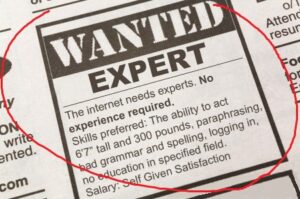 No one denies the fact that our world needs experts, thought leaders, and world-renowned specialists.
No one denies the fact that our world needs experts, thought leaders, and world-renowned specialists.
That’s because it’s clear that we DO need people who are capable of dedicating their entire time and efforts to gaining as much experience as possible for one important thing — so they can teach and help others.
There are experts in every field known to humankind, and here in the Internet Age, we make great use of the expertise of these people. However, there is a huge “but” connected to that.
Do we rely too much on “experts?”
It’s this: Problems arise when people rely too much on what they read, which is the information touted by all of these modern experts. Even if the information you get is from a reputable and well-known expert, it doesn’t necessarily mean that THEIR solution will fit YOUR case.
Yes, other people may come forward and confirm that this expert provided the solution they needed, but that doesn’t mean that the advice will work for you, too. This is especially true in recruitment, because what works for someone in one location, with one specific set of needs, may not work for someone working in another location who has a different set.
But, let’s start at the beginning here: How did people end up trusting these modern “experts” so much?
We can connect this widespread general trust in experts to one thing: familiarity. These experts usually have good visibility, and they appear on TV, or on the radio, in magazines, online, at conferences and public events, or in almost any environment that gives them public exposure.
 Once people get familiar with these “experts,” see them almost everywhere, and hear them in the media voicing their opinion and expertise on some topic, they become familiar and knowledgeable about the expert and their beliefs.
Once people get familiar with these “experts,” see them almost everywhere, and hear them in the media voicing their opinion and expertise on some topic, they become familiar and knowledgeable about the expert and their beliefs.
This sense of familiarity makes people begin to trust this person, especially if people pop up who say they were helped by the solutions or information provided by the expert.
It’s true: You should always question “expert” advice
No one is stopping you following the advice promoted by an expert, but you should be fully aware that there is the risk of their advice and experience not working in your case. How can such a thing happen?
The answer lies in this critical fact: We are not all the same.
Each person has their own evolution and is subjected to a different set of factors. An expert’s solution may fit the background generated by the evolution and influencing factors, which means that the required answer will be delivered or it may not fit the background, leading to a solution that will not solve someone’s problem.
No matter how much we would like to believe that we may fit into the group of people who were successfully helped by experts, we should always question the information provided by them. While they may have top-notch training, vast experience, and a deep knowledge set, they’re still human.
Yes, it’s impossible to know it all.
Also, bear in mind that frequently, an expert’s fame comes also from the results of marketing campaigns and skilled PR, or from their great skills of self-promotion. And that is absolutely OK because many of us are looking for a way to rise, shine and be heard.
Don’t believe everything you read (or hear)
However, there is always the chance that an expert is not the “savior” you thought he or she was. A healthy thing to do is to constantly question and challenge the information we get from these people. Is the information valid in your case? How will it help you, and will it be able to produce the positive changes you seek?
Before taking ANY advice, you should do some thorough research on your own and see how much it fits your case. If you hear that, “Cold calling is not working anymore,” will you stop doing that just because some expert weighed in about it?
It would be risky to bet everything on someone’s opinion just because the media gave that person the title of “expert.”
Again, this is not an attempt to discredit the expertise of people who built a strong reputation through their hard work and study, but it IS a recommendation that you should not take for granted everything they write or say because something they write or say may not really apply to you.
In an era where information is widely and easily available, more and more people, in their search to find the needed answer, end up stumbling across solutions provided by these so-called “thought leaders.” In some cases, the information they find proves to be useful, but, when it doesn’t deliver the expected results, people become disappointed and start believing that they are failures, or, that fate is against them.
Of course, this is nonsense.
One is not ill-fated or a loser if something an expert said doesn’t work in his or her particular situation. The problem does not lie in the person, but in the fact that the solution that was thought to be correct actually wasn’t.
Final thoughts
Our trust in things we see on the Internet is growing every day. That’s why “fake news” gets so much attention from us. And when we also stop double-checking facts, and embrace everything we find on the Internet as correct, we help spread the bad information even further.
Here’s an example that illustrates how Internet-driven “facts” that are not double-checked are spreading like wildfire.
You may be surprised by this, but I like to listen to Tony Robbins, because he is very inspiring and an incredibly successful motivational speaker. When I was watching one of his videos on YouTube, he mentioned a “goal setting study” that was done at Yale University back in 1953. I was quite impressed the information so I decided to try to find that study on the Internet and read more about the results.
The first few results that I found on Google revealed to me that there was no such study done at Yale University. Tony’s source, I learned, was motivational speaker Zig Ziglar, so I dug further and found that when people asked Mr. Ziglar about his source, he told them he had only heard the statistics mentioned over the years but had no concrete source for the information.
This reinforced for me the fact that it’s very important to double-check the source of information. Next time you read things that proclaim “Cold calling is dead,” “How to double the pipeline,” “Job Boards are dead,” or other advice and conventional wisdoms, remind yourself that not everything the experts say is true, or that if you follow their advice unconditionally, everything will work out for you.
We all need to filter the information experts provide through our own experiences while taking into account the factors that are specific to our specific case so we will end up using only those pieces of information that turn out to be valid for our situation.
It’s good to be inspired by experts like Tony Robbins and Zig Ziglar, but we shouldn’t blindly follow their advice.
No matter how good or professional an expert’s statement or article looks, sometimes, the best way to learn is to double-check the data is by asking simple questions like, “Why?” “Where you get that information?” and “What is your source?”
Trust is a great thing, but blind trust, where you trust everything you see or hear, is a recipe for others to manipulate you. That’s something you should never, ever forget.
Authors
Jan Tegze
Jan Tegze is Senior Recruiting Manager at SolarWinds, a company that “provides powerful and affordable IT management software to customers worldwide, from Fortune 500 enterprises to small businesses, managed service providers (MSPs), government agencies, and educational institutions.” He is also the author of the book Full Stack Recruiter: The Modern Recruiter's Guide, published October 2017. Jan has extensive experience in full life cycle recruiting, and broad knowledge in international recruiting, sourcing, recruitment branding, marketing and pro-active innovative sourcing techniques. Connect with him on LinkedIn or follow him on Twitter @jantegze .
Recruit Smarter
Weekly news and industry insights delivered straight to your inbox.





